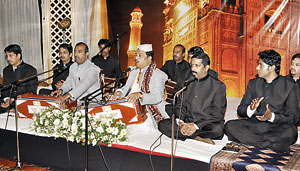I was no stranger to Qawwali songs or music as some in the audience were. At least I have heard Qawwali songs featured in Hindi cinema and hummed them. I am often enthralled by the popular Qawwali hits Hai Agar Dushman, Dushman in the hit movie Hum Kisi Se Kam Nahi, Yari Hai in Amitabh Bachan’s Zanjeer and Qurbani in blockbuster movie Qurbani.
An evening of Qawwali entertainment took place recently at the Galadari Hotel when the Pakistan High Commission together with Pakistan International Airlines hosted a cultural week, featuring among other events a fashion show and exhibition.
But it was not like what I had seen in Hindi cinema. This was different – the original sans its commercial value additions or corruptions. It had no glamour or pretty Zeenat Aman but there was deep meaning.
The two singers and the choir gave the audience a taste of the mystic world of a Sufi who reaches God by purifying his heart from evil thoughts and turns away from all else but God.
Qawwali music is more than eight centuries old and it owes its origins to festivals at Sufi shrines. A Qawwali session is in fact a collection of several devotional songs played to Persian, Turkish and North Indian music. The first song, Hamd glorifies God Almighty, the second item, Naat, sings the praises of Prophet Muhammad, the third, Manaqabat, is devoted to Caliph Ali or to a Sufi saint, the fourth, marsiya, recalls the martyrdom of Prophet Muhammad’s grandson at Karbala, Iraq and the fifth, sixth, seventh and the eighth can be poetic expressions of love, romance, nature and other-worldly matters.
Though many in the audience that included First Lady Shiranthi Rajapaksa, several ministers, diplomats and top businessmen, did not understand the words of the songs, they agreed after the show that the music alone helped them to enjoy the evening. There was not a moment the audience felt that they were at the wrong place.
Their applause at the end of every item encouraged the Pakistani duo –Ghulam Fareed Ayaz and Abu Muhammad – and their eight-member all male choir. However meaningful the poetry is, without a voice to sing it, it remains dead. The deep voices of Fareed Ayaz and Abu Muhammad made the poetry stand out and move to the music that flowed from their harmoniums and dholaks played by two members of the team while the rest of the eight-member choir clapped and chorused.
Those who knew the meaning of the words swayed their heads and raised their hands in appreciation while their hearts remained moved and their eyes were filled with tears by their love for God and His prophet.
Probably aware that many Sri Lankans and diplomats in the audience were strangers to Qawwali, Pakistan High Commissioner Seema Illahi Baloch made it a point to explain what it was when she addressed them before the session started. “The tradition of Qawwali is very special because it helps us understand compassion for human kind which is the essence of Islam. It is embodied in the message of the Sufis and conveyed through the Qawwali in the sub-continent,” she said.
She said the message conveyed through Qawwali had become even more significant in both Pakistan and Sri Lanka ravaged by wars, terrorism and natural disasters. “In these trying times, we yearn for peace in the outside world and within over selves. The Sufis show us the path to that peace,” she said.
|


